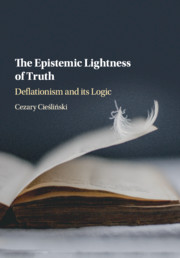Introduction
Published online by Cambridge University Press: 30 November 2017
Summary
Is there anything more familiar and obvious than the opposition of truth and falsity? It is true that the earth is round. It is false that dragons eat virgins. (As everyone knows, dragons eat only pistachio marzipan with vanilla truffle.) Elementary, is it not? However, if this is so familiar, what then is truth? When confronted with such a direct question, many of us are tempted to repeat the famous words of Saint Augustine: “If no one asks me, I know what it is. If I wish to explain it to him who asks, I do not know”.
Being that no decent philosopher can rest satisfied with ignorabimus, some answers have naturally been proposed. Indeed, answers have proliferated, with various philosophical schools promoting their own worldviews and agendas. Unfortunately, no lasting consensus has emerged, with the only exception perhaps being the following. Philosophers seemed to agree that the task of explaining the nature of truth is a daunting one; it is hard, complicated, deep and far-reaching. However, in recent times, serious doubts have emerged even here. Some modern philosophers have reacted to the ancient puzzles with a bold claim; they have said that, in fact, truth has no nature, and the very concept of truth is, in some sense, innocent or trivial. This book is devoted to the analysis and assessment of this claim.
So, what is truth? Here is a selection of quotes giving answers to this question.
• ‘To say of what is that it is not, or of what is not that it is, is false, while to say of what is that it is, and of what is not that it is not, is true.’ (Aristotle, Metaphysics, IV 7, 1011b27)
• ‘Veritas est adaequatio intellectus et rei.’ (‘Truth is the conformity of the intellect to the things.’ Thomas Aquinas, Summa Theologica I, Q 16)
• ‘The nominal definition of truth, namely that it is the agreement of cognition with its object, is here granted and presupposed.’ (I. Kant, Critique of Pure Reason, A 57-8/B 82)
In one crucial respect, the first of these classical formulations is rather different from the other two.
- Type
- Chapter
- Information
- The Epistemic Lightness of TruthDeflationism and its Logic, pp. ix - xivPublisher: Cambridge University PressPrint publication year: 2017



